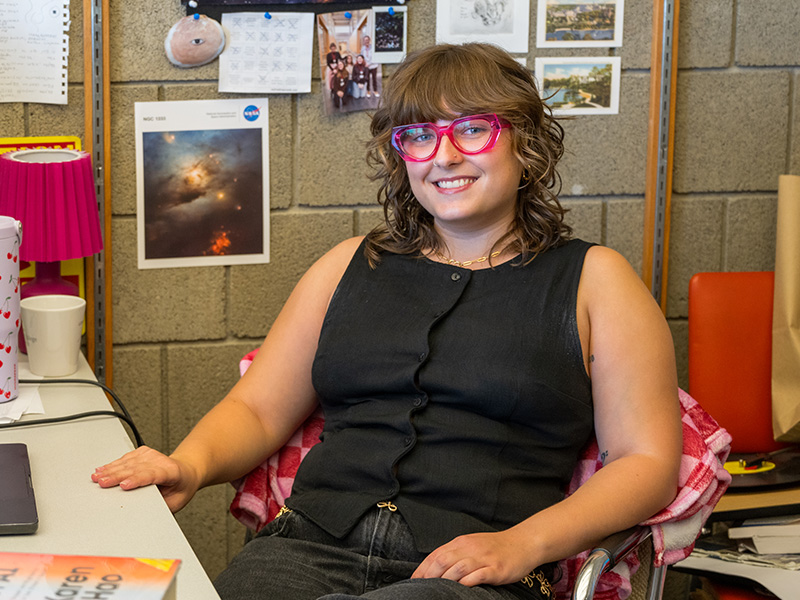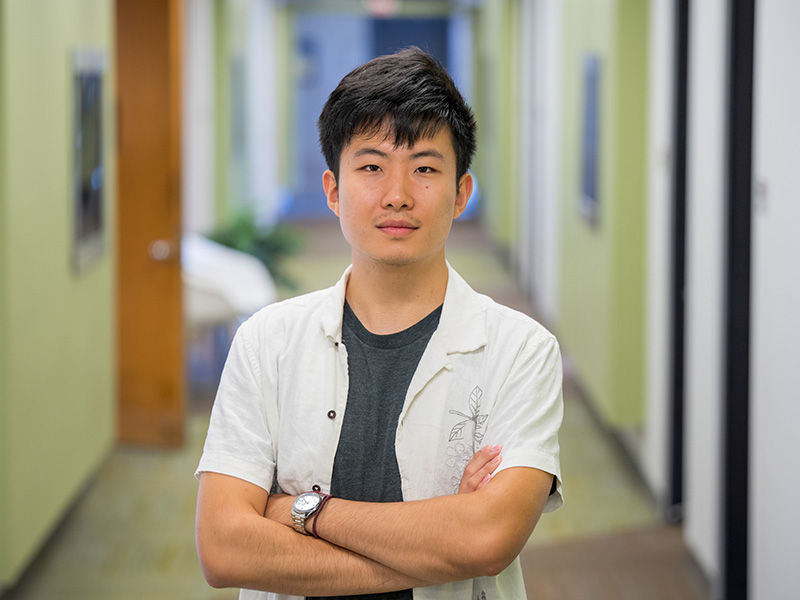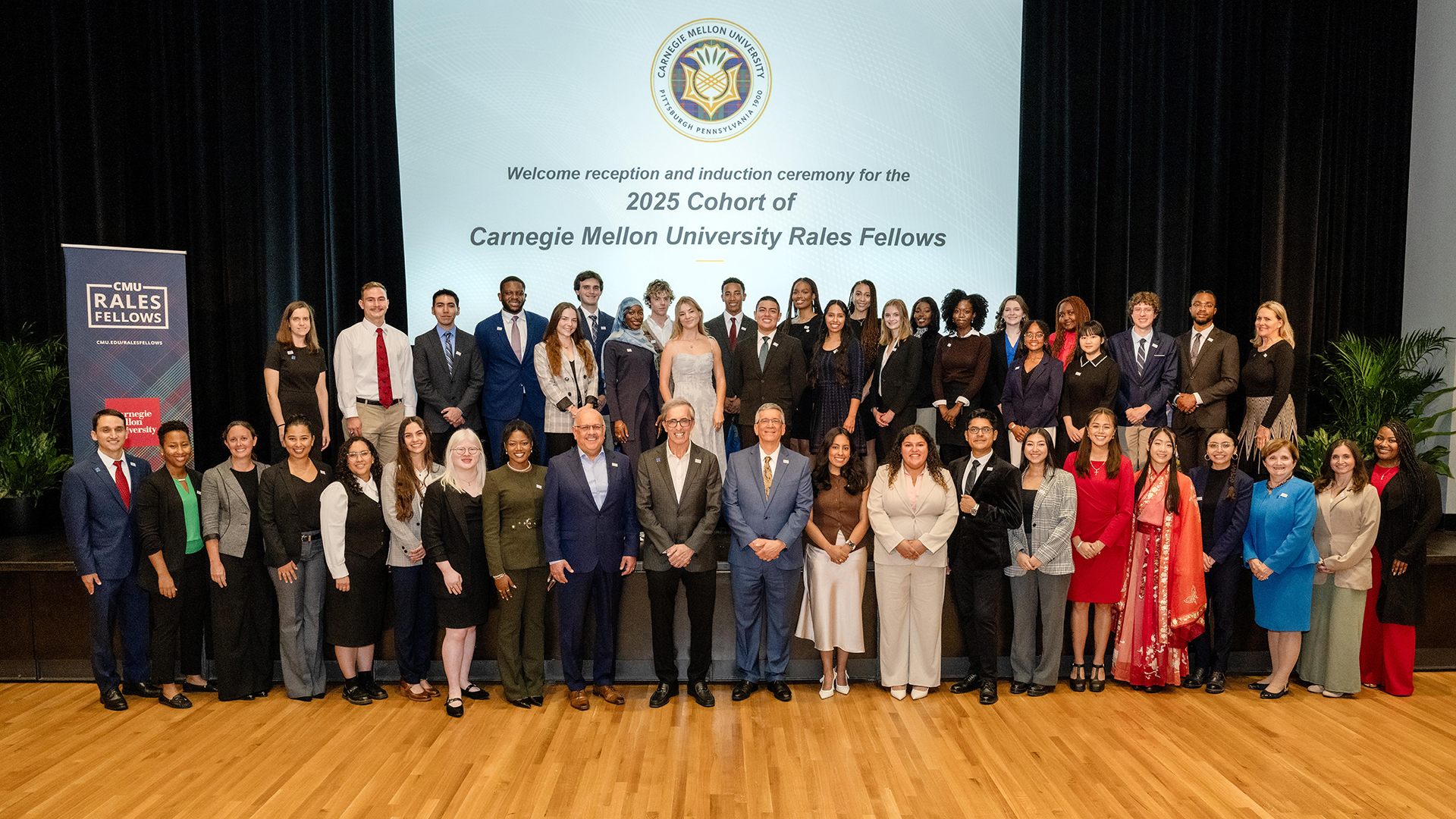

In This Section
MCS Students Earn NSF Graduate Research Fellowships
Carnegie Mellon alumni and students received 25 fellowships and 26 honorable mentions
By Amy Pavlak Laird Email Amy Pavlak Laird
- Associate Dean of Marketing and Communications, MCS
- Email opdyke@andrew.cmu.edu
- Phone 412-268-9982
At Carnegie Mellon University’s Mellon College of Science, graduate students aren’t just learning science — they’re redefining it. From reshaping drug delivery with degradable polymers to pioneering AI-powered enzyme assays, from refining telescope image analysis to challenging assumptions in dark matter models, these students are tackling some of science’s most complex questions with bold, original thinking that surprises even their advisers.
Four of these trailblazers have been named recipients of the National Science Foundation’s Graduate Research Fellowship — a highly competitive award that recognizes exceptional early-career researchers in science, technology, engineering and mathematics. The fellowship provides the time, resources and recognition they need to pursue transformative ideas that could shape the future of science.
“Fellowships like these are vital to the future of science,” said Barbara Shinn-Cunningham, Glen DeVries Dean of the Mellon College of Science. “Training the best and brightest young minds to be the next generation of scientific leaders ensures our nation stays competitive globally. The discoveries they will make and knowledge they will create will fuel future devices, healthcare treatments, and technologies, even when the long-term impact isn’t always immediate or easy to predict.”
The fellowship provides three years of annual financial support consisting of a $37,000 stipend and $16,000 for tuition. Earning an NSF Graduate Research Fellowship this year was more competitive than usual as the total number of awards was reduced from the more typical 2,000 to 1,500. Among this year’s fellowship recipients are 25 Carnegie Mellon students and alumni; another 26 received honorable mentions.
Answering cosmic questions

“It’s just a huge privilege to be able to focus all my time on research,” said Sofia Splawska, a third-year graduate student in the Department of Physics. “It’s hard when you’re taking classes and teaching and doing research.”
Splawska is making the most of the flexibility. Earlier this semester, she attended a conference and she’s preparing for a trip to Chile to use the Magellan Clay Telescope. As someone who analyzes telescope data to uncover insights about the universe, she never imagined having the opportunity to visit a telescope in person.
“I'm at least one step removed from the actual observing, so this is very unique privilege to be able to go and interact directly with the instruments,” she said. “I'm extremely lucky.”
Splawska said observers have a different sense of the important uncertainties in the data and when it should be trusted. This is key, especially when it comes to studying dark matter, the unseen material that is proposed to make up 80 percent of the matter in the universe. Splawska’s work centers on estimating the amount of dark matter in dwarf galaxies that orbit the Milky Way. But because dark matter can’t be seen, scientists rely on observations — like the speed of the orbits of the stars in the dwarf galaxy — to infer how much dark matter there is. Splawska’s interested in exposing how many assumptions go into translating observations into dark matter calculations.
“I think there's a lot of underappreciated sources of uncertainty,” she said.
Smart science vs. superbugs: How AI is changing the fight against resistance

For Emma Bouchard, a second-year graduate student in the Department of Chemistry, winning the NSF GRFP was powerful validation. As a more traditional biochemist working in the computational chemistry arena, she often feels a step behind, especially considering that she learned how to code last year. But gaining recognition for her research proposal at the national level is like a clear signal: she belongs in the room, she has earned her place and she knows what she's talking about.
“I feel like it's going to be life changing,” said Bouchard, whose work bridges chemistry, robotics and artificial intelligence.
Bouchard is building an automated system to help scientists quickly find new ways to fight bacteria and stay ahead of antibiotic resistance. But, even more importantly to her, she’s bringing robust, standardized methods for using AI in the lab.
“My pitch to the NSF wasn't, we need more antibiotics. It was not even based on that,” Bouchard said. “It was, there are no solidified systems, there is no methodology to follow. There is no proof-of-concept. It's like the Wild West of chemical discovery.”
Bouchard is aiming to change that. She’s working to fully automate the “one-pot assay” to study the six enzymes that work together to build a bacteria’s cell wall. If you block any of these enzymes, the wall breaks down and the bacteria die. One of these enzymes is already targeted by antibiotics, but resistance is a problem. Bouchard is working on a faster, smarter way to find novel compounds that can block the enzymes. Any promising compounds she finds have the potential to be developed into new, effective drugs. By combining robotics, real-time data collection, and machine learning, the system minimizes human input and speeds up testing.
A new approach to chemotherapy — delivery systems that disappear

Ivan Levkovsky also is working on ways to make drugs more effective — but from a completely different angle.
Levkovsky, a second-year graduate student in the Department of Chemistry, is designing degradable bottlebrush polymers to improve chemotherapy. His work builds on his undergraduate research with alpha-lipoic acid, a biocompatible molecule that can be used to make degradable polymers. At Carnegie Mellon, he’s moved from simple linear polymers to designing complex polymer architectures that can carry many more drug molecules to tumor cells and then degrade harmlessly.
Levkovsky says he chose Carnegie Mellon to work with Krzysztof Matyjaszewski, a world- famous polymer chemist. He recalls Matyjaszewski being genuinely excited to have him join the lab and bring his expertise on alpha-lipoic acid — a hot topic in polymer chemistry. Already, Levkovsky has published two papers in high-profile journals.
“It is unusual for an incoming graduate student to bring such a solid experience and blend it creatively with our expertise,” said Matyjaszewski, who notes that Levkovsky deserves NSF recognition. “An NSF fellowship is a very rare distinction.”
Levkovsky said the NSF GRP will give him more time to focus on research, and he feels privileged to be able to bring additional funding to the lab.
Making the most of every pixel: AI for astronomical discovery

Like Levkovsky, Eason Wang’s top choice for graduate school was Carnegie Mellon. As an undergraduate, he worked on using machine learning in cosmology, so CMU was the perfect fit.
Wang, a first-year graduate student in the Department of Physics, is taking classes and finishing up an undergraduate project from the University of Arizona, but he hopes to start working on his NSF-funded project next semester. He plans to use machine learning to boost the resolution of low-quality spectra, making data from space telescopes more useful for scientific analysis. By training a neural network to enhance spectral detail — similar to going from 1080p to 4K on a YouTube video — he’s aiming to match lower-resolution data to the quality of higher-resolution data from surveys like the James Webb Space Telescope. Wang’s hope is to develop a tool that can help scientists get more value from existing observations and expand the reach of future surveys.
For Wang, the fellowship is validation and motivation.
“It’s the first achievement that I can truly be proud of,” he said. “There’s still a part of me that has imposter syndrome, so I will have to keep pushing forward, bettering myself to make myself worthy of this award.”
Together, these four students represent the future of science — not just in their fields, but in their approach. They are interdisciplinary, data-driven and unafraid to challenge assumptions.
With NSF support, MCS students are not just asking big questions. They are building the tools to answer them.

